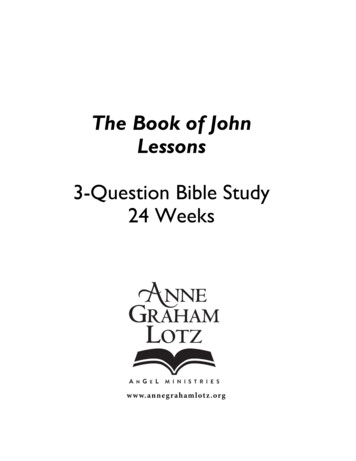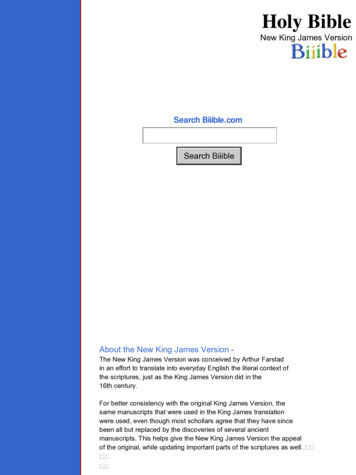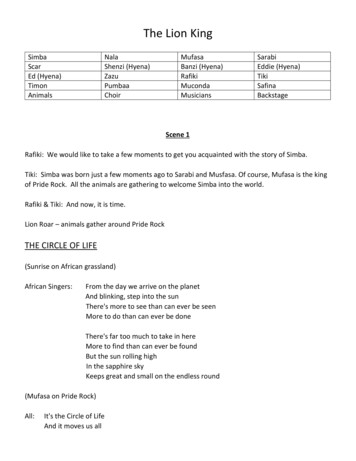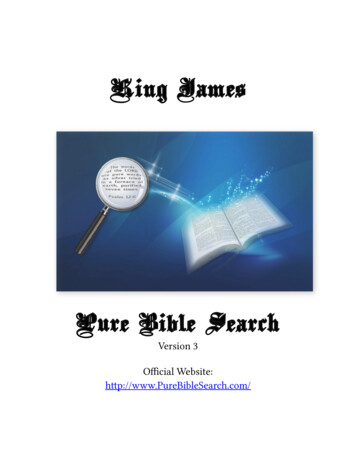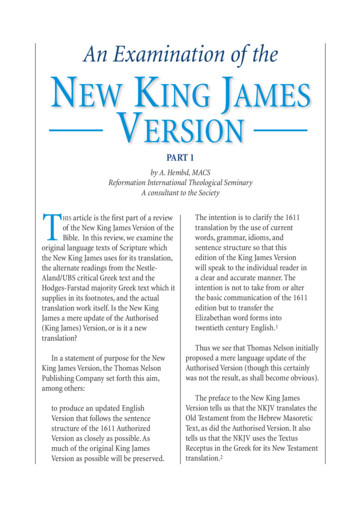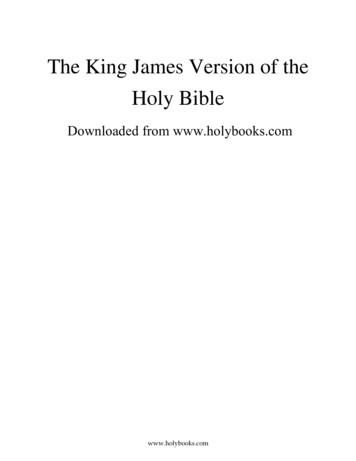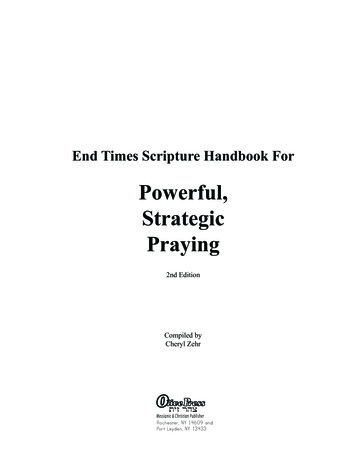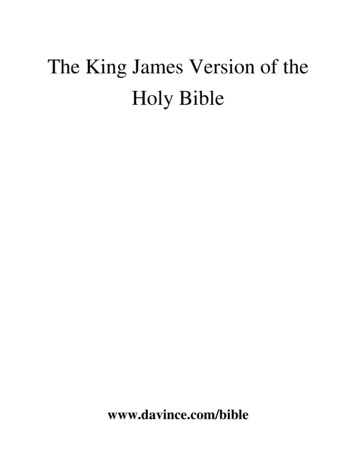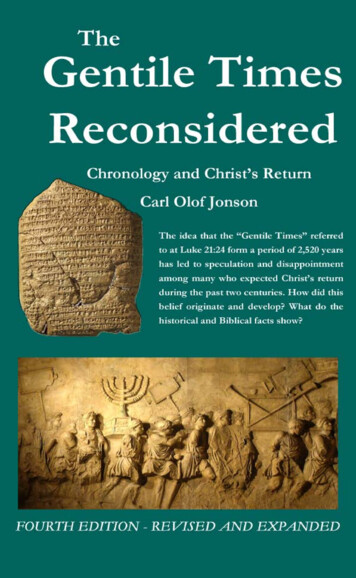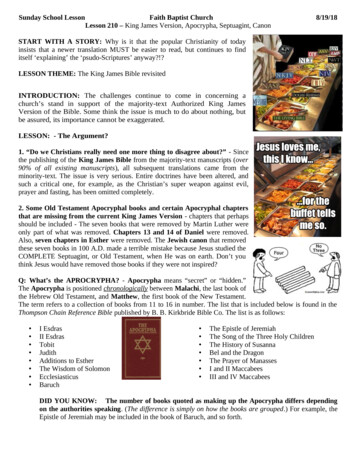
Transcription
Sunday School LessonFaith Baptist ChurchLesson 210 – King James Version, Apocrypha, Septuagint, Canon8/19/18START WITH A STORY: Why is it that the popular Christianity of todayinsists that a newer translation MUST be easier to read, but continues to finditself ‘explaining’ the ‘psudo-Scriptures’ anyway?!?LESSON THEME: The King James Bible revisitedINTRODUCTION: The challenges continue to come in concerning achurch’s stand in support of the majority-text Authorized King JamesVersion of the Bible. Some think the issue is much to do about nothing, butbe assured, its importance cannot be exaggerated.LESSON: - The Argument?1. “Do we Christians really need one more thing to disagree about?” - Sincethe publishing of the King James Bible from the majority-text manuscripts (over90% of all existing manuscripts), all subsequent translations came from theminority-text. The issue is very serious. Entire doctrines have been altered, andsuch a critical one, for example, as the Christian’s super weapon against evil,prayer and fasting, has been omitted completely.2. Some Old Testament Apocryphal books and certain Apocryphal chaptersthat are missing from the current King James Version - chapters that perhapsshould be included - The seven books that were removed by Martin Luther wereonly part of what was removed. Chapters 13 and 14 of Daniel were removed.Also, seven chapters in Esther were removed. The Jewish canon that removedthese seven books in 100 A.D. made a terrible mistake because Jesus studied theCOMPLETE Septuagint, or Old Testament, when He was on earth. Don’t youthink Jesus would have removed those books if they were not inspired?Q: What’s the APROCRYPHA? - Apocrypha means “secret” or “hidden.”The Apocrypha is positioned chronologically between Malachi, the last book ofthe Hebrew Old Testament, and Matthew, the first book of the New Testament.The term refers to a collection of books from 11 to 16 in number. The list that is included below is found in theThompson Chain Reference Bible published by B. B. Kirkbride Bible Co. The list is as follows: I EsdrasII EsdrasTobitJudithAdditions to EstherThe Wisdom of SolomonEcclesiasticusBaruch The Epistle of JeremiahThe Song of the Three Holy ChildrenThe History of SusannaBel and the DragonThe Prayer of ManassesI and II MaccabeesIII and IV MaccabeesDID YOU KNOW: The number of books quoted as making up the Apocrypha differs dependingon the authorities speaking. (The difference is simply on how the books are grouped.) For example, theEpistle of Jeremiah may be included in the book of Baruch, and so forth.
It wasn’t until over 1,500 years after the resurrection of Jesus Christ that 11 of the Apocryphal books werecanonized by the Roman Catholic Church at the Council of Trent in 1546 A.D. The Apocryphal writings are OldTestament-era.It must be noted that the Hebrew Old Testament found in the King James Version is known as the Masoretictext. It was faithfully protected by the Hebrew Levitical order and Hebrew scholars. They were the keepers andprotectors - the source of the Old Testament. The Hebrew canon rejects the Apocryphal books.Concerning the Old Testament, Dr. Henry Morris weighs in with the following:As far as the Hebrew text is concerned, the King James is based on the Masoretic(meaning, handed down) text, while the modern versions rely heavily on Kittel’s revisedMasoretic text.The Masoretic text was compiled from the ancient manuscripts of the Old Testament bythe Hebrew scholars dedicated to guarding and standardizing the traditional Hebrew text“handed down” from the earlier Hebrew scribes, who has in turn meticulously copied theancient Hebrew manuscripts, scrupulously guarding against error. As far as the Hebrewtext developed by Rudolf Kittel is concerned, it is worth noting that Kittel was a Germanrationalistic higher critic, rejecting Biblical inerrancy and firmly devoted toevolutionism.The Christian church received the Old Testament from the Masoretic text. The Apocrypha is not in it.In the New Testament, there are 219 direct quotes from the Old Testament covering 300 verses. Forty-four OldTestament people are mentioned in the New Testament. In addition, the Old Testament is alluded to hundreds oftimes in the New Testament. Keep that in mind as you read the following.Concerning the Apocrypha, the Thompson Chain lists the following:1. They are never quoted by Jesus, and it is doubtful if they were ever alluded to by the apostles.2. Most of the early Fathers regarded them as uninspired.3. They did not appear in the Ancient Hebrew canon.4. The inferior quality of most of the writings as compared with the canonical books, stamps them as unworthy ofa place in the sacred Scriptures.Jerome, who produced the Catholic Vulgate, (a translation of scriptures intoLatin) did not originally endorse the Apocryphal books.According to Bible researcher G. A. Riplinger, the translators of the KingJames Version said that the Apocrypha was not to be viewed as Holy Scripturebecause it was not written in Hebrew, nor ever accepted by the Jewish canon orearly Christians, nor ever mentioned by Jesus Christ. Riplinger points out somefalse doctrines that were spawned by the Apocrypha:1. Almsgiving expiates sins. Almsgiving saves from death and purges everykind of sin. (Ecclesiasticus 3:30; Tobit 12:9)Ecclesiasticus 3:30 - “Water will quench a flaming fire; and alms maketh an atonement for sins.”Tobit 12:9 - “For alms doth deliver from death, and shall purge away all sin. Those that exercise almsand righteousness shall be filled with life:”2. Purgatory and prayers for the dead. (II Macabees 12:39-45)II Macabees 12:39-45 - “And upon the day following, as the use had been, Judas and his company cameto take up the bodies of them that were slain, and to bury them with their kinsmen in their fathers' graves.
40 Now under the coats of every one that was slain they found things consecrated to the idols of theJamnites, which is forbidden the Jews by the law. Then every man saw that this was the cause whereforethey were slain.41 All men therefore praising the Lord, the righteous Judge, who had opened the things that were hid,42 Betook themselves unto prayer, and besought him that the sin committed might wholly be put out ofremembrance. Besides, that noble Judas exhorted the people to keep themselves from sin, forsomuch asthey saw before their eyes the things that came to pass for the sins of those that were slain.43 And when he had made a gathering throughout the company to the sum of two thousand drachms ofsilver, he sent it to Jerusalem to offer a sin offering, doing therein very well and honestly, in that he wasmindful of the resurrection:44 For if he had not hoped that they that were slain should have risen again, it had been superfluous andvain to pray for the dead.45 And also in that he perceived that there was great favour laid up for those that died godly, it was anholy and good thought. Whereupon he made a reconciliation for the dead, that they might be deliveredfrom sin.”3. The Immaculate Conception for Mary; reincarnation and transmigration of souls for New Agers andHindus. (Wisdom 8:19-20)Wisdom 8:19-20 - “For I was a witty child, and had a good spirit. Yea, rather, being good, I came unto abody undefiled.”It must be noted that the battle of translations finds its root in Egypt - the place where Israel was commandedby God never to return. Egypt was to Israel the origin and symbol of their bondage. During the days of Jeremiahthe prophet, the remnant of the children of Israel considered returning to Egypt to escape their fear of the king ofBabylon.These following 11 verses in Jeremiah 42:19-22 and 43:1-7 depictthe situation: 42:19 “The LORD hath said concerning you, O ye remnant of Judah;Go ye not into Egypt: know certainly that I have admonished you this day. For yedissembled in your hearts, when ye sent me unto the LORD your God, saying, Pray for usunto the LORD our God; and according unto all that the LORD our God shall say, sodeclare unto us, and we will do it. And now I have this day declared it to you; but ye havenot obeyed the voice of the LORD your God, nor any thing for the which he hath sent meunto you. Now therefore know certainly that ye shall die by the sword, by the famine, and bythe pestilence, in the place whither ye desire to go and to sojourn.43:1 “And it came to pass, that when Jeremiah had made an end of speaking unto all thepeople all the words of the LORD their God, for which the LORD their God had sent him tothem, even all these words, Then spake Azariah the son of Hoshaiah, and Johanan the sonof Kareah, and all the proud men, saying unto Jeremiah, Thou speakest falsely: the LORDour God hath not sent thee to say, Go not into Egypt to sojourn there: But Baruch the son ofNeriah setteth thee on against us, for to deliver us into the hand of the Chaldeans, that theymight put us to death, and carry us away captives into Babylon. So Johanan the son ofKareah, and all the captains of the forces, and all the people, obeyed not the voice of theLORD, to dwell in the land of Judah. But Johanan the son of Kareah, and all the captainsof the forces, took all the remnant of Judah, that were returned from all nations, whitherthey had been driven, to dwell in the land of Judah; Even men, and women, and children,and the king’s daughters, and every person that Nebuzaradan the captain of the guard hadleft with Gedaliah the son of Ahikam the son of Shaphan, and Jeremiah the prophet, andBaruch the son of Neriah. So they came into the land of Egypt: for they obeyed not thevoice of the LORD: thus came they even to Tahpanhes.
These Jews were fully rebellious against the Word of God. It should be no surprise that they participated in thecontamination of it. The Jews of Alexandria, Egypt, purportedly gave the world the Septuagint. In regard tothe Septuagint and the Apocryphal books, Thompson Chain states:“The Jews of the Dispersion in Egypt placed a high estimate upon these books, and included them in the Greektranslation of the Old Testament, called the Septuagint, but they were rejected from the Hebrew canon by theJews of Palestine.”Maybe you have heard the term ‘Alexandrian Text’?!? Yeah, that’s how it got to BE in the great Library ofAlexandria kept in such fine pristine condition.Luke 4:16-21: ”And he came to Nazareth, where he had been brought up: and, as his custom was, he went into the synagogue on the sabbath day,and stood up for to read. And there was delivered unto him the book of the prophet Esaias. And when he had opened the book, he found the placewhere it was written, The Spirit of the Lord is upon me, because he hath anointed me to preach the gospel to the poor; he hath sent me to heal thebrokenhearted, to preach deliverance to the captives, and recovering of sight to the blind, to set at liberty them that are bruised, To preach theacceptable year of the Lord. And he closed the book, and he gave it again to the minister, and sat down. And the eyes of all them that were in thesynagogue were fastened on him. And he began to say unto them, This day is this scripture fulfilled in your ears.”Only the Hebrew text of the Bible was honored in the temple and synagogues. Jesus was not reading fromthe Greek Septuagint. (The Jews considered the Greeks as dogs, remember.)Riplinger, citing The Septuagint by Zondervan Publishing, and The Encyclopedia of Religion and Ethics, reportsthe following:“Even the edition of The Septuagint marketed today points out in its preface that the stories surrounding its B.C.creation and existence are fables. All of the LXX manuscripts cited in its concordance were written after A.D.200. The Encyclopedia of Religion and Ethics elaborates calling “the Letter of the pseudo-Aristeas, a manifestforgery and the fragments of Aristobulus, which have also been highly suspect.”The existence of an entire Greek Old Testament predating the life of Christ has NO EXTANTDOCUMENTATION. In fact, only scraps containing a few Old Testament chapters in Greek have ever beenfound. Also out of Alexandria, Egypt, comes Origen, who in A.D. 213, headed up the Philosophical Schoollocated there. Riplinger suggests the true authorship of the Septuagint belongs to Origen. Riplinger records thefollowing in the 690-page research work, New Age Versions:The Septuagint (LXX), a Greek translation of the Old Testament, is used today by textual critics, in manyinstances, to determine the wording of new versions. It appears that Origen was the author of this A.D.document. The NIV translators admit they use the O.T. text which was “standardized early in the third century byOrigen.” Hence, Origen’s six column Old Testament, the Hexapla, is used as the LXX today. It is freely drawnfrom by new translation editors to alter the Masoretic Hebrew Text.”The name Origen is an important name to remember. He was a promoter of the Greek Septuagint whichINCLUDES the Apocrypha as well as a promoter of the minority-text New Testament Greek manuscripts whichwere used by Westcott and Hort. It’s from this fountain that today’s modern English translations hail.The following excerpt is from the New Advent Catholic Encyclopedia (www.newadvent.org):Nevertheless, it is certain that St. Jerome greatly praised and made use of Origen, that he even transcribed someerroneous passages without due reservation.”Keep in mind that it was Jerome who gave the world the Catholic Latin Vulgate Bible, and from the Vulgatecomes the Catholic English Douay.The ‘early church’ declared Origen a heretic because he held the following beliefs:
1. The Logos (Jesus) is subordinate to the Father and has some characteristics similar to the Logos of theGnostics.2. The soul is preexistent; Jesus took on some preexistent human soul.3. There was no physical resurrection of Christ nor there be asecond coming. Man will not have a physical resurrection.4. Hell is nonexistent; purgatory, of which Paul and Petermust partake, does exist.5. All, including the Devil, will be reconciled to God.6. The sun, moon and stars are living creatures.7. Emasculation, of which he partook, is called for males.Q: How can someone read the Bible and come upwith this stuff? It’s EASY, if you WRITE YOUR OWN!Jesus did not study the Septuagint nor did He endorse byreference the Apocrypha contained in it.As early as 100 A.D., all 27 books in the New Testamentcontained in the canon today were widely honored by thebelievers of old. In addition, these books were in use andcirculated as soon as they were written. One of the credentialsof Holy Writ was that they were written by the Apostles orendorsed by the Apostles such as Brother Luke. The criterion of apostolicity was laid out by Tertullian, whowas known as “the Father of Latin Theology.” He died in 225 A.D. — long before the councils.The Authorized King James Version of 1611 finds its Old Testament in the Masoretic text endorsed by theHebrew canon, and its New Testament in the majority-text. The majority-text represents well over 90% of theover 5,000 Greek handwritten manuscripts that contain the New Testament scriptures. On grounds of sourcing,age, and scholarship, it is the authority in the English-speaking world, whether the world likes it or not.FOOD FOR THOUGHT::. There have been more than 5k cataloged fragments and manuscripts of the NewTestament cannonized books. They were very well circulated and produced. Compare this to the NEXT most circulated/published ‘manuscript’ of this era, “Homer’s Iliad”, the best-sellerof the greeks, which we’ve found only 650 fragments and manuscripts.Why is it that no one questions the accuracy of Homer’s work, written about 800 B.C., with so few pieces, but yeteveryone want’s to be skeptical when it comes to the well documented Scriptures?!?
According to Bible researcher G. A. Riplinger, the translators of the King James Version said that the Apocrypha was not to be viewed as Holy Scripture because it was not written in Hebrew, nor ever accepted by the Jewish canon or early Christians, nor
